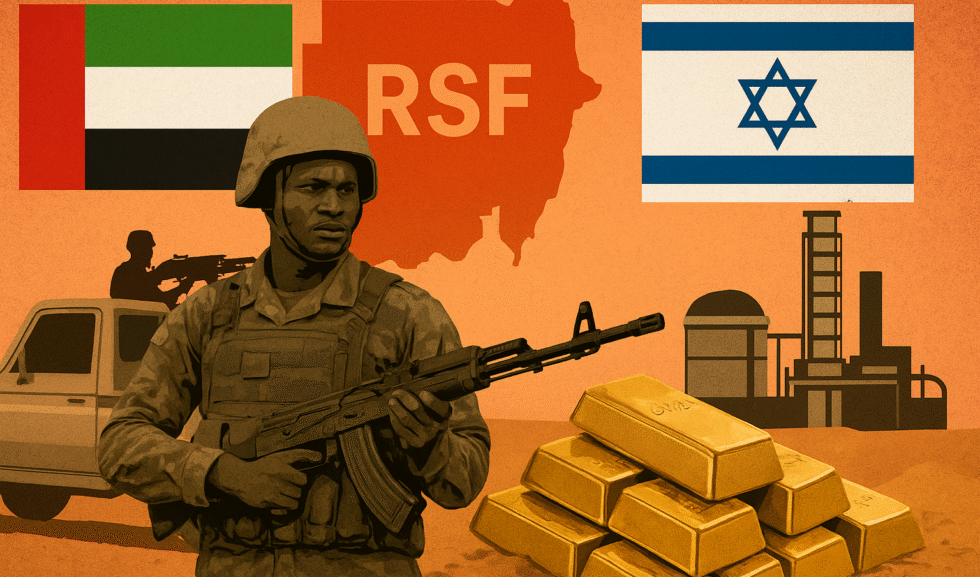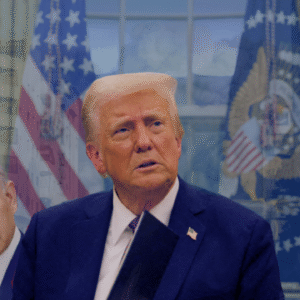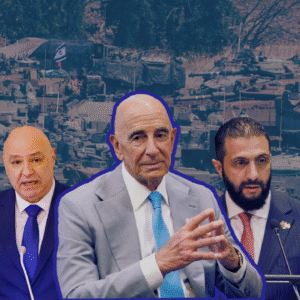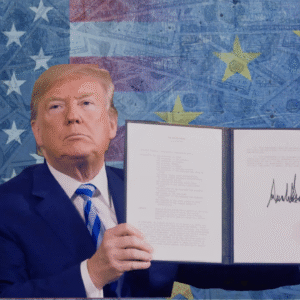Gold, Power, and Chaos: UAE and Israel’s Hidden Hand in the Sudan War

Sudan has become the stage for one of the world’s most devastating proxy wars, where foreign powers fuel a conflict that has left millions on the brink of famine.
At the heart of the crisis lies the struggle for gold, power, and influence—linking the battlefields of Khartoum and Darfur to the palaces of Abu Dhabi and Tel Aviv.
The UAE’s sponsorship of the Rapid Support Forces (RSF) in Sudan’s war aligns with Israeli intervention in the armed clashes. The two powers collaborate in destabilizing Sudan for the sake of resource extraction and to curb Islamist influence.
Background on the War
The Sudan war, which erupted in April 2023, is tied to global financial interests, with sponsors of opposing parties profiting from the chaos.
During the Arab Spring revolutions, Sudanese civilians protested against Omar al-Bashir’s rule, demanding a transition to democratic governance. In April 2019, al-Bashir was ousted and replaced by the Transitional Military Council, which later shared executive power with a civilian-military Sovereignty Council and a prime minister.
Fearing the collapse of the fragile power-sharing arrangement, Gen. Abdel Fattah al-Burhan, head of the Sudanese Armed Forces (SAF), and Gen. Mohamed Hamdan Dagalo (Hemedti), leader of the RSF, organized a coup d’etat in October 2021.
Al-Burhan became the de facto head of state, ending Sudan’s democratic transition. The two generals soon failed to uphold their power-sharing arrangement, culminating in the RSF’s mobilization against the national government.
The RSF, rooted in the Janjaweed militias, has been accused of crimes against humanity by international institutions. It officially formed in 2013 and was used by al-Bashir’s government to fight rebel groups and to serve in the Saudi-led war in Yemen. In 2019, the military junta employed the RSF to crack down on pro-democracy protests in Khartoum.
Fighting in this civil war has been concentrated in Khartoum and Darfur. Civilians are caught in the conflict as Sudan faces what has been described as the world’s worst humanitarian crisis, with 25 million people in dire need of aid.
In January 2025, the U.S. State Department declared that RSF and allied militias had committed genocide in Darfur.
The UAE’s Exploitation of Sudan
The UAE’s interests in Sudan predate the war. In exchange for logistical support, safe havens and military supplies, the RSF took part in Gulf-led warfare in Yemen. This relationship provided Hemedti with diplomatic legitimacy and combat experience, strengthening his position against the state army.
The UAE’s dominance in the illicit gold trade is a key feature of its influence in Africa. The RSF’s control of gold mining operations makes it a valuable proxy for the Gulf monarchy. In Darfur, Hemedti’s monopoly over mining areas has expanded since the start of the war.
A UN panel of experts estimated that about $860 million worth of gold was extracted from RSF-controlled mines in Darfur in 2024 alone. Much of that gold is smuggled into the UAE, according to UN reports.
“There’s significant money coming out of these operations, making the UAE a key player in Sudan’s war,” says Brian Adeba, a senior policy advisor on Sudan.
This arrangement provides the RSF with independent revenue and a weapons supply network through Chad, Libya, Uganda and other countries. The UAE, in exchange, strengthens its trading hub in Dubai, supplies the RSF with arms and fuels the humanitarian crisis for its own economic interests.
The UAE’s role in the conflict reflects its bid for regional expansion. By supporting post-Bashir paramilitary factions, the UAE counterbalances Turkey and Qatar, both of which had closer ties to al-Bashir’s Islamist government.
Although the UAE publicly called for “dialogue and restraint” during the last coup, it maintained ties with both al-Burhan and Hemedti. The RSF, however, became its primary partner. Hemedti’s forces have seized large areas of Khartoum and other regions, looting infrastructure and terrorizing civilians.
While humanitarian groups have highlighted the UAE’s role in illegal gold exports and war crimes, international pressure has remained limited. No sanctions have been imposed on Abu Dhabi, raising questions about the credibility of the global order.
Israeli Influence and Similar Patterns
In September 2024, Israeli Prime Minister Benjamin Netanyahu held up two maps at the UN General Assembly—“The Curse” and “The Blessing.” The latter highlighted Israel’s allies in green, including Egypt, Saudi Arabia, the UAE and Sudan.
Israel’s role in Sudan revolves around advancing normalization agreements and limiting Hamas’ influence. While the UAE has focused on the RSF, Israel has cultivated ties with the SAF.
Since the 1990s, Hamas had established offices, businesses and training camps in Sudan. Al-Bashir’s regime, a supporter of Islamist movements, was a key ally of the group.
As part of the Muslim Brotherhood network, al-Bashir’s government provided Hamas with financial channels and weapons routes to Gaza via Egypt. After his ouster in 2019, Sudan’s transitional government sought international legitimacy and distance from its pariah status.
In 2020, Sudan agreed to join the Abraham Accords and was removed from the U.S. list of state sponsors of terrorism. A meeting between al-Burhan and Netanyahu in Uganda was brokered by Emirati President Mohamed bin Zayed. Sudan later froze Hamas assets in the country. Israeli Foreign Minister Eli Cohen visited Khartoum in February 2023.
Hemedti, then serving as al-Burhan’s deputy, deepened his ties with the UAE and built links with Mossad. He voiced support for normalization, appealing to both Washington and Abu Dhabi. Despite opposition from civilian factions, the two generals became the faces of normalization, both seeking foreign aid and recognition.
Sudan’s normalization process expanded Israel’s influence in Africa and the Red Sea. Regionally isolated countries have sought collaboration with the U.S.-Israeli alliance in exchange for legitimacy, effectively making them stakeholders in their domestic affairs.
A Proxy Battlefield for Foreign Powers
External involvement has transformed Sudan’s crisis into a broader regional conflict. By backing warlords, foreign powers have turned Sudan into a contested prize.
Although the UAE and Israel support opposing sides in the war, they have preserved their alliance and shared interests—unlike other proxy conflicts. Both aim to curb Islamist movements such as the Muslim Brotherhood and seek a weakened Sudanese state with limited sovereignty.
The exploitation of Sudan’s internal conflict has fueled humanitarian disaster and regional instability. As the UAE backs Israel’s war on Palestinians, patterns of oppression mirror across borders.
If you value our journalism…
TMJ News is committed to remaining an independent, reader-funded news platform. A small donation from our valuable readers like you keeps us running so that we can keep our reporting open to all! We’ve launched a fundraising campaign to raise the $10,000 we need to meet our publishing costs this year, and it’d mean the world to us if you’d make a monthly or one-time donation to help. If you value what we publish and agree that our world needs alternative voices like ours in the media, please give what you can today.















